Beijing in the Time of SARS
After paying taxes and looking after other general housekeeping in the States,
I returned to China at the end of the first week of April, just as SARS seemed to arrive in Beijing. As we now know,
the disease had actually been here for months.
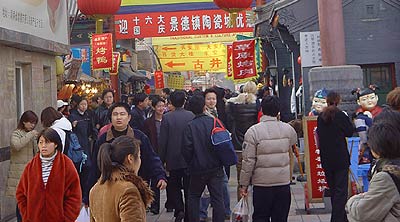
I went back to Taipei Language Institute, my Chinese school, and began studying five hours of Chinese a day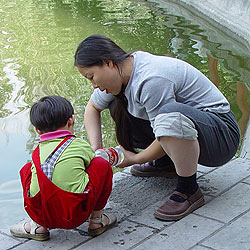 in one-on-one tutorial (slapping myself on the back, proud of my prodigious course load, trying out my new skills on unsuspecting taxi drivers and waitresses.) In my glee, I didn’t pay much attention to the escalation of worry around the city. Several international kindergartens and elementary schools closed down, those embassies which had not already done so sent their non-essential personnel home. Suddenly mask wearers went from a tiny minority to about 25 percent of pedestrians. Some people bought extra food.
in one-on-one tutorial (slapping myself on the back, proud of my prodigious course load, trying out my new skills on unsuspecting taxi drivers and waitresses.) In my glee, I didn’t pay much attention to the escalation of worry around the city. Several international kindergartens and elementary schools closed down, those embassies which had not already done so sent their non-essential personnel home. Suddenly mask wearers went from a tiny minority to about 25 percent of pedestrians. Some people bought extra food.
But morale among the Chinese stayed high. Nervous expats sent spouses and children home, but none of my acquaintance considered leaving. The sense was that SARS infected only those in very close proximity (kissing, treating medically, etc.) and that fatal cases occurred in those already ill, old, or in otherwise weakened health. All the major functions of the city continued, many joked about the disease, though already suspicions about the government’s cover-up abounded.
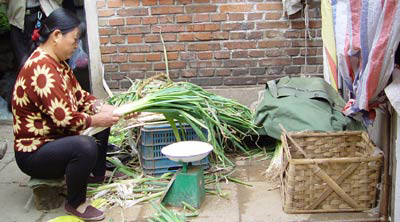 The new leader, Hu Jin Tao, told the world and all Chinese that the government had the situation under control. He said that Beijing was safe, that those sick had been found and quarantined, and that numbers in Guangdong and Hong Kong (the first hard hit areas) were falling. Of course, the next day Hong Kong had the highest fatality rate to that point.
The new leader, Hu Jin Tao, told the world and all Chinese that the government had the situation under control. He said that Beijing was safe, that those sick had been found and quarantined, and that numbers in Guangdong and Hong Kong (the first hard hit areas) were falling. Of course, the next day Hong Kong had the highest fatality rate to that point.
Then came last weekend. In one fell swoop, the government admitted that Beijing itself was home to 400 cases, not 40, and that many had died. They simultaneously fired the public health minister and the Beijing mayor, and cancelled the spring national laborers holiday (May Day). The number of mask wearers doubled overnight, and major offices in Beijing developed a policy of meeting every day to discuss the situation and any new restrictions. I went to school that Monday (the announcements had been made on Sunday) and the school manager was talking about shutting down.
That day, Monday of last week, public places began to disinfect the air and all surfaces by spraying chlorine solutions and vinegar. Waiters were broadcasting straight vinegar from large bowls onto the sidewalks in front of their establishments. An ever larger percentage of pedestrians wore masks on the streets, but a new sort of mask wearer had developed. Up until this point, no service employees with direct customer contact had worn masks; Chinese, obsessed with right behavior and politeness, especially in commerce, thought masks would turn customers off or away. On Monday and Tuesday, waiters, taxi drivers and every other person in contact with customers wore a mask; opinion had reversed itself as fear of the disease developed to a point where customers avoided unmasked vendors…
On Wednesday, rumors emerged that Beijing would soon be under martial law. My school closed and my spirits fell—why be in Beijing if I couldn’t study? Beijing’s universities began closing their gates, effectively quarantining their populations on-campus. Some continued to offer classes, some did not. Taxis stopped driving non-mask wearers. Many small shops began to close their doors. Suddenly 70-80 percent of pedestrians were wearing masks. Rumors of the disease’s source abounded. The shuttle disaster? Biological weapons? The Americans trying to stifle China’s economy? Some rumors were more bizarre than others.
spirits fell—why be in Beijing if I couldn’t study? Beijing’s universities began closing their gates, effectively quarantining their populations on-campus. Some continued to offer classes, some did not. Taxis stopped driving non-mask wearers. Many small shops began to close their doors. Suddenly 70-80 percent of pedestrians were wearing masks. Rumors of the disease’s source abounded. The shuttle disaster? Biological weapons? The Americans trying to stifle China’s economy? Some rumors were more bizarre than others.
Then came news that at least 800 people in Beijing had the virus and as many as 75 had died. People began again to wonder about the government cover up. Road blocks stopped people leaving the city and entering it. But most people have been allowed to continue on their way. Some public places have been closed only to re-open the next day. People have bought up all the staples in stores, but they’ve been replenished nightly—no food crisis. News that the city has had helicopters spraying disinfectant at night seem only to be rumors, but a rumor most people believe. I’ve even heard people say that it isn’t disinfectant, but pesticide—maybe the disease is really borne in flees and bugs. What is certainly not a rumor is that as late as Thursday of last week, a Beijing hospital put 50-100 of its worst SARS cases in a bus and a neighboring hotel during a WHO visit to the hospital. Clearly the full story has not yet come out.
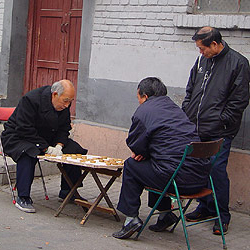 Now, a week since the government “came clean,” none of the universities (that I know of—word of mouth is generally how news travels about these things as the China Daily doesn’t like to print such discouraging news) are holding classes; all elementary and most secondary schools are closed. Two major hospitals, including Beijing People’s University hospital, have been completely closed off and quarantined. The Chinese are building a 1000 person temporary hospital north of the city, to be finished in ten days’ construction time. But, the most interesting things have been happening in the streets.
Now, a week since the government “came clean,” none of the universities (that I know of—word of mouth is generally how news travels about these things as the China Daily doesn’t like to print such discouraging news) are holding classes; all elementary and most secondary schools are closed. Two major hospitals, including Beijing People’s University hospital, have been completely closed off and quarantined. The Chinese are building a 1000 person temporary hospital north of the city, to be finished in ten days’ construction time. But, the most interesting things have been happening in the streets.
Many, many Chinese are not leaving their homes. The streets, usually clogged with traffic in cars and buses, on bikes and foot, are empty. A 25 minute taxi ride suddenly takes five. Cabbies I’ve asked say they are down to 20% of normal fares. Restaurants are empty and many have limited their menus—I have never before seen an empty restaurant in China; as a culture, Chinese eat out far more often than we do.

The tourist industry is non-existent. By Friday the Great Wall Sheraton, one of Beijing’s major hotels, had only seven occupied rooms. The silk market, a back alley market of pirated and copied goods (North Face, Timberland, Polo, Mont Blanc, Rolex… all the current rage) and a favorite spot of tourists and Chinese alike, usually teems with people. Now, the place is nearly empty—about a third of vendors have packed up and left, and those that remain are asking tiny prices for their goods. What cost 20 dollars a week ago costs 4 now.
I spent the weekend antiques shopping, a favorite weekend pastime. Western dealers who stock up here every few months would apparently rather let their stock get low than venture to Beijiing. So prices are bargain basement low. Five hundred year old Yuan dynasty chests (priced around 1000 US dollars a month ago) can be had for 400. XinJiangese rugs, usually 12-1400 sell for 600-700.
Some expats have been saying they’ve never enjoyed Beijing so much. The city is quieter, restaurant service is quicker, even the smog seems less. But in the last couple of days even that has changed. Most expats’ insurance (including mine) includes an evacuation clause; if the insured party is hospitalized, the insurer must fly them home and care for them in a US hospital. As of Friday, China is enforcing a policy of quarantining all SARS patients as well as relations and close contacts of those infected. In China, many hospitals have only limited capacity to feed and bathe patients because traditionally the families of patients come and look after these needs. The new quarantine rules prohibit such coming and going, and hospitals are having real trouble taking care of these needs. Expat or not, this is the fate of infected people.
is quicker, even the smog seems less. But in the last couple of days even that has changed. Most expats’ insurance (including mine) includes an evacuation clause; if the insured party is hospitalized, the insurer must fly them home and care for them in a US hospital. As of Friday, China is enforcing a policy of quarantining all SARS patients as well as relations and close contacts of those infected. In China, many hospitals have only limited capacity to feed and bathe patients because traditionally the families of patients come and look after these needs. The new quarantine rules prohibit such coming and going, and hospitals are having real trouble taking care of these needs. Expat or not, this is the fate of infected people.
Dad and I talk every day about whether to stay or leave. On the one hand it seems stupid to stay in the host city of an epidemic. On the other, Beijing is a city of 11 million, and cases remain low. The disease seemed to have a death rate of 4-6 percent, but now reports hint that it may be as high as ten percent if it spreads beyond the ability of hospitals to handle every case (a number Beijing is fast approaching.) The WHO says transmission of the disease is less likely than flu, that fluids must exchange in order to acquire the virus. We wash our hands all the time, keep the windows open in taxis, observe a healthy distance from interlocutors.
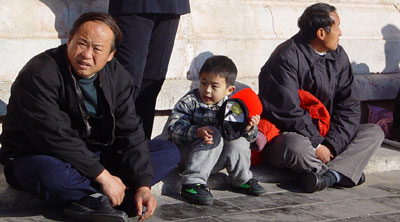 So, we have chosen an alternative route—go to Xin Jiang, in the Chinese northwest (think Tajikistan, Uzbekistan, Tibet) for a few days. We will travel, I will try to buy a rug or two, and hope to observe the mix of Kyrgyz, Tajiks, Hui, Uighur, Tibetan, Turkmen, and Han Chinese that call the place home. We hope to venture to Kashgar, near the Tajik border but may stay centered near Orumqi. I am excited to see 20,000 foot mountains, Chinese mosques, and eat lots of lamb kebabs. Also, without an interpreter, I will be in charge of getting us around.
So, we have chosen an alternative route—go to Xin Jiang, in the Chinese northwest (think Tajikistan, Uzbekistan, Tibet) for a few days. We will travel, I will try to buy a rug or two, and hope to observe the mix of Kyrgyz, Tajiks, Hui, Uighur, Tibetan, Turkmen, and Han Chinese that call the place home. We hope to venture to Kashgar, near the Tajik border but may stay centered near Orumqi. I am excited to see 20,000 foot mountains, Chinese mosques, and eat lots of lamb kebabs. Also, without an interpreter, I will be in charge of getting us around.
And when we come back, we will undoubtedly both turn tail and leave China for a while.
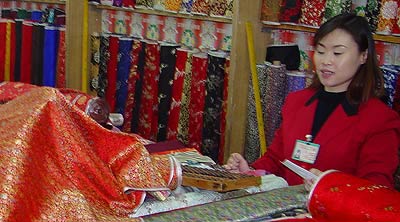 I played ultimate Frisbee today, as I do most Sundays, with Beijing Ultimate, a largely expat club team. The only thing anybody talks about is SARS, but these people are not afraid. Most read NYTimes.com and other news online. Most Chinese do not. Most foreigners here have a better sense of the reality of the situation than the Chinese do. And a smaller proportion of foreigners than of Chinese seem to be wearing face masks. Because the economy has slowed to a near halt, many offices are closed or otherwise only open for business a few hours a day. Nobody wants to leave Beijing (of those who remain,) but very little is happening here. Many students have been told their exams will be cancelled, some have been told their degrees will not be awarded this spring at all. But, in general, the foreigners are much less worried than the Chinese. Several of my teachers had originally agreed to continue teaching me Chinese during the “vacation,” but have now reneged, obliging their husbands' orders to stay at home.
I played ultimate Frisbee today, as I do most Sundays, with Beijing Ultimate, a largely expat club team. The only thing anybody talks about is SARS, but these people are not afraid. Most read NYTimes.com and other news online. Most Chinese do not. Most foreigners here have a better sense of the reality of the situation than the Chinese do. And a smaller proportion of foreigners than of Chinese seem to be wearing face masks. Because the economy has slowed to a near halt, many offices are closed or otherwise only open for business a few hours a day. Nobody wants to leave Beijing (of those who remain,) but very little is happening here. Many students have been told their exams will be cancelled, some have been told their degrees will not be awarded this spring at all. But, in general, the foreigners are much less worried than the Chinese. Several of my teachers had originally agreed to continue teaching me Chinese during the “vacation,” but have now reneged, obliging their husbands' orders to stay at home.
I don’t know how bad things have really gotten, or how bad they are likely to get, but I know that the financial strain is already enormous. Yesterday, lunching in a small restaurant just out of town, we were informed they couldn’t charge the prices on the menu because costs had increased. She said the price of fresh produce has not inflated much, but because they had served no meals for two days prior to our entering, they would have to run out and buy the produce then, and not in the bulk they priced for.
Every day I walk by countless shops, restaurants, barbers, foot massage joints, illegal DVD vendors whose proprietors stand idle in their doorways kicking imaginary pebbles. As usual, the small guys and the transient laborers have been the first to lose work. The Chinese I know, usually so upbeat, so optimistic, so positive, have begun to show real demoralization. And of course, the government is suspected of serious mismanagement.
The net effect of SARS on me has been minor disappointment. My expectations for language study and immersion in Chinese culture have fallen short; instead I have spent this time among expats talking about SARS and which restaurants remain open. I do wash my hands more regularly, and I am less likely to buy food from street vendors. Wandering the city, I store memories of the quiet, empty places. I will revisit these memories with mixed feelings the next time I am pressed body-to-body in the Silk Market, Pangia Yuan, or Hong Chao. I will resent the crowds but welcome the smiles which are bound to return to Chinese faces.

